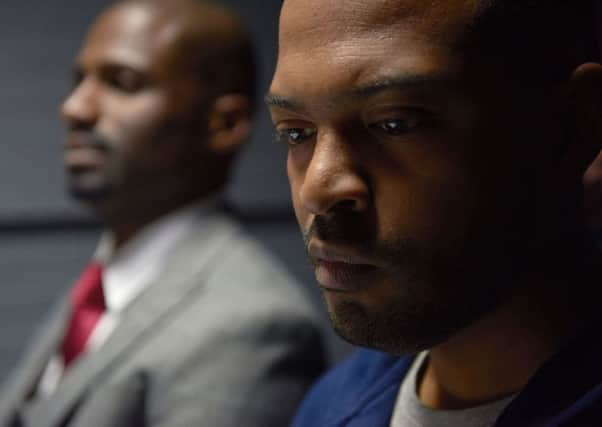End of an era


Not long ago on the edge of a film location in the freezing wilds of North Yorkshire, Noel Clarke outlined his plans for the future.
The film was I Am Soldier, a low-budget tale of SAS selection and covert warfare.
Advertisement
Hide AdAdvertisement
Hide AdClarke was at the heart of what he loved best – labouring on British indie cinema with people he knew and trusted.
But he’d also explored the worlds of big-budget blockbusters, having appeared in the Star Trek franchise.
Clearly this actor-writer-director-producer was looking to expand his repertoire.
“I’m not afraid of hard work and for me the challenge is always to do something different,” said this prolific one-man production force.
Advertisement
Hide AdAdvertisement
Hide Ad“I was offered about five different projects and I made a conscious choice to not just work with people that I know and like. I think it’s time to elevate myself again.
“In your career you have your peaks and then you plateau. I’ve done everything I wanted to do in the hoodie/gangster thing.
“It’s now time to step up to a new level. Star Trek and this and the one after this [a film called The Legacy] are the films that will do that.”
It didn’t quite work out that way. Consequently Clarke, now 40, is back in Brotherhood, the third in a series of spiky urban dramas focusing on Sam Peel, a thirtysomething bloke caught up in the violent world of aggressive streetwise teens.
Advertisement
Hide AdAdvertisement
Hide AdVariously described as potent and powerful or embarrassing and unrealistic, Kidulthood, its follow-up Adulthood (which Clarke directed as well as scripting) and now Brotherhood have acquired a specific audience that almost demanded a finale to the saga.
Brotherhood is set to draw a line under this mini franchise. The hashtag on the posters reads #TheEnd. Yet it might not have happened if Clarke’s career hadn’t endured one of those periodic plateaus.
For a brief period of time Clarke was seen as almost something of a renaissance man in modern British cinema.
After becoming disenchanted with the roles being offered to him he sat down and wrote his own script. That was 2006’s Kidulthood.
Advertisement
Hide AdAdvertisement
Hide AdA key supporting role in Doctor Who as Mickey Smith brought him to the wider public’s attention. Then came Adulthood and, in 2009, a BAFTA as Rising Star.
Added to the Olivier Award he’d received in 2002 as most promising newcomer, Clarke seemed to be on his way.
“The BAFTA was definitely a door-opener,” he agrees.
“My life hasn’t changed massively. I’m looking at career longevity so I work more, and I get the attention of people like JJ Abrams [who directed Star Trek Into Darkness].
“But things haven’t changed that much. I like to work with other writer/directors.
Advertisement
Hide AdAdvertisement
Hide Ad“I worked with Neil Marshall on Centurion and because I’m hired to that job – act – I do it. The benefit is that if they need you, you’re there. Sometimes I do look at lines and say, ‘Do I need to say that?’
“The director might ask me what I’m thinking. If he says, ‘Keep the line’ then we keep it. If he sees where I’m coming from he might take the line out.
“If I’m acting, I’m acting. I don’t go over someone’s shoulder and say, ‘Why not try this shot here?’ It’s very disrespectful to step on someone’s shoes. It’s their vision, not mine. I’m here to do it as they visualise it.”
The Clarke output has been primarily B movies and straight-to-video releases. There have been some foreign productions and some TV work.
Advertisement
Hide AdAdvertisement
Hide AdThrough all of it one senses Clarke is soaking up knowledge and experience as he navigates a route that will take him to that new level he yearns for.
He smiles when he remembers the audition that led to his involvement in Star Trek Into Darkness, and the four months that followed in Los Angeles for shooting. “You don’t say no to jobs like that!” he says.
But the 40-year-old Londoner always had more directing in mind.
Maybe, like Hollywood heavyweights Harrison Ford and Bruce Willis, who came back to Indiana Jones and John McClane when their careers quietened, it was always on the back burner. Pigeonholing wasn’t a concern.
Advertisement
Hide AdAdvertisement
Hide Ad“I want people to start talking about the films and the performances as opposed to [saying], ‘Oh, Noel again!
“He’s done another hoodie thing’. I think I’ve broken the pigeonholing thing because I stopped doing the hood films after number two.
“The danger is that, because a lot of my stuff has done all right over here [in the UK] I’m like a ‘face’. If I go to the restaurant with the cast and crew I’ve got to sign ten pictures. People know me.”
And consequently they want more of the same. Clearly the demand is still out there, and Clarke needs to fulfil it. Be it low-budget grit or megabudget interstellar sci-fi, he’ll consider all offers with equanimity.
Advertisement
Hide AdAdvertisement
Hide Ad“You get offered what you get offered, you know? You might not always get the opportunities.
“I feel that I’m still going to do what I do, I’m still going to direct and write but I’m not going to be as prolific. I’ve made a conscious decision to do less and make sure they’re better.”
Brotherhood (15) is out on general release now.